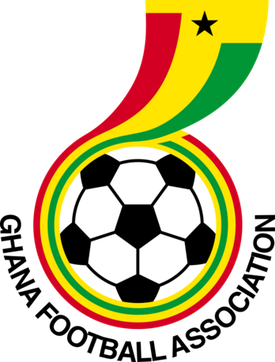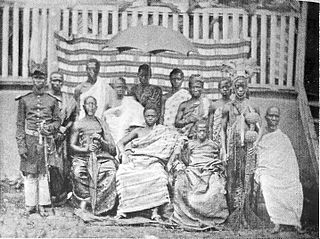Related Research Articles

The area of the Republic of Ghana became known in Europe and Arabia as the Ghana Empire after the title of its Emperor, the Ghana. Geographically, the ancient Ghana Empire was approximately 500 miles (800 km) north and west of the modern state of Ghana, and controlled territories in the area of the Sénégal River and east towards the Niger rivers, in modern Senegal, Mauritania and Mali. The empire appears to have broken up following the 1076 conquest by the Almoravid General Abu-Bakr Ibn-Umar. A reduced kingdom continued to exist after Almoravid rule ended, and the kingdom was later incorporated into subsequent Sahelian empires, such as the Mali Empire. Around the same time, south of the Mali empire in present-day northern Ghana, the Kingdom of Dagbon emerged. The decentralised states ruled by the tindaamba were unified into a kingdom. Many sub-kingdoms would later arise from Dagbon including the Mossi Kingdoms of Burkina Faso and Bouna Kingdom of Ivory Coast. Dagbon pioneered Ghana's earliest learning institutions, including a university town, and a writing system prior to European arrival.

Ghana Airways Limited was the flag carrier of Ghana, with its main base of operation and hub at Kotoka International Airport in Accra. The airline ceased operations in 2004, although plans were discussed to revive it in 2020 in partnership with Egyptair.

The Ghana Football Association (GFA) is the governing body of association football in Ghana and is based in Accra the capital of Ghana. Founded in 1957, the Association was dissolved by the Ghanaian Minister of Sport, Isaac Kwame Asiamah, on 7 June 2018, after the discovery of corruption in the association through investigative videos. In October 2019, a new president, Kurt Okraku, was elected as the association reconvened upon the completion of the work of the FIFA Normalization Committee. Mark Addo was later elected vice president in November 2019. Kurt Edwin Simeon-Okraku has been re-elected as President of the Ghana Football Association during their 2023 Elective Congress in Tamale in the Northern region Ghana.
Bank of British West Africa (BBWA) was a British Overseas bank that was important in introducing modern banking into the countries that emerged from the UK's West African colonies. In 1957 it changed its name to Bank of West Africa, and in 1965 was acquired by Standard Bank.

The Akyem are an Akan people. The term Akyem is used to describe a group of four states: Asante Akyem, Akyem Abuakwa, Akyem Kotoku and Akyem Bosome. These nations are located primarily in the eastern region in south Ghana. The term is also used to describe the general area where the Akyem ethnic group clusters. The Akyem ethnic group make up between 3-4 percent of Ghana's population depending on how one defines the group and are very prominent in all aspects of Ghanaian life. The Akyem are a matrilineal people. The history of this ethnic group is that of brave warriors who managed to create a thriving often influential and relatively independent state within modern-day Ghana. When one talks of Ghanaian history, there is often mention of The Big Six. These were six individuals who played a big role in the independence of Ghana. Of the big six, people of Akyem descent made up the majority.

Chief Shafi Lawal Edu, popularly known as S.L. Edu, was a Nigerian businessman, Environmentalists and conservationist from Epe, Lagos State. He founded the Nigerian Conservation Fund, a non-governmental organization involved in conservation projects, and was a former member of the council of the World Wildlife Fund.

The National Liberation Council (NLC) led the Ghanaian government from 24 February 1966 to 1 October 1969. The body emerged from a coup d'état against the Nkrumah government carried out jointly by the Ghana Police Service and Ghana Armed Forces with collaboration from the Ghana Civil Service.
Alhassan Dantata ; 1877 – 17 August 1955) was a Northern Nigerian trader in kola nuts and ground nuts, and he was a distributor of European goods. He supplied large British trading companies with raw materials and also had business interests in the Gold Coast. At the time of his death, he was the wealthiest man in West Africa. He is the great-grandfather of Aliko Dangote, the wealthiest person in Nigeria and Africa.
Nana Arhin Duah is a Ghanaian football striker, who last played for Ashanti Gold SC.

Nana Sir Ofori Atta I, KBE was the Okyenhene or King of the Akyem people and of Akyem Abuakwa, a traditional kingdom that stretches back to the thirteenth century and was one of the most influential kingdoms of the then Gold Coast Colony. He ruled from his election in 1912 until his death in 1943.

Charles Odamtten Easmon or C. O. Easmon, popularly known as Charlie Easmon, was a medical doctor and academic who became the first Ghanaian to formally qualify as a surgeon specialist and the first Dean of the University of Ghana Medical School. Easmon performed the first successful open-heart surgery in Ghana in 1964, and modern scholars credit him as the "Father of Cardiac Surgery in West Africa". Easmon was of Sierra Leone Creole, Ga-Dangme, African-American, Danish, and Irish ancestry and a member of the distinguished Easmon family, a Sierra Leone Creole medical dynasty of African-American descent.
Ghana's most popular sport is football, followed by boxing, Athletics, Badminton and basketball.
Frank Rajah Arase is a Nigerian film director. Arase is a native of Edo State, Nigeria. He was nominated for Best Director at the 4th Africa Movie Academy Awards.
Nana Awere Damoah is a Ghanaian author. He has six books to his credit. Damoah, who is a British Council Chevening alumnus with a master's degree in chemical engineering from the University of Nottingham, works as a Technical Manager in Lagos, Nigeria
Saratu Atta is a Ghanaian administrator and lawyer. She is a member of the New Patriotic Party and the current Personal Assistant for the President of Ghana.
Saliu Bolaji Bakare was a Nigerian businessman who owned one of the largest stevedore business in Nigeria during the 1960s. Originally providing staffing services to Nigerian Railways, he later extended the service into the shipping sector and acquiring some of the assets of William Hamilton Biney.
Kwaku Amoa-Awuah, also known by the name Kwaku Manu, was a Ghanaian politician in the first republic. He was the member of parliament for the Akim Abuakwa East constituency from 1954 to 1965. In 1965, he became the member of parliament representing the Suhum constituency and the Minister for Labour. Prior to his ministerial appointment, he served as deputy minister in various ministries. During the fourth republic he was made chairman of the council elders of the Convention People's Party, a post he held until December 2014.

Nana Amoako Atta I,, was the paramount chief of Akyem Abuakwa in nineteenth century southern Ghana. Locally, his position is known as the Okyehene or Omanhene. He ruled the traditional kingdom from July 1866 to 1880 and from 1885 to 1887. After the Sagrenti War of 1874, the British declared Akyem Abuakwa a colonial possession, legally called a ‘protectorate’, as part of the Gold Coast. This development led to a clash between the old traditional Akan culture and the imposition of the new Western Christian political order.

The Political history of Ghana recounts the history of varying political systems that existed in Ghana during pre-colonial times, the colonial era and after independence. Pre-colonial Ghana was made up of several states and ethnic groups whose political system was categorized by 3 main administrative models; Centralized, Non-centralized and Theocratic states. In the colonial era, the British Empire employed different forms of government among its four territorial possessions in the Gold Coast. Indirect rule was implemented in the late 19th century after its success in Northern Nigeria. From the 1940s, native Ghanaians yearned for more autonomy. This resulted in the several constitutional reforms as well as the creation of the office of the Prime Minister in 1952.
Nana Kobina Nketsia V is a Ghanaian chief and academic. He completed his secondary education at Mfantsipim School in Cape Coast, Ghana. Nketsia obtained his first degree in Modern History from the University of Ghana, and later earned a Doctor of Philosophy in African History from the University of Calabar in Nigeria. His areas of interest include Pan-Africanism, African Culture and Religion, Governance, Law, and Philosophy.
References
- ↑ Forrest, Tom (1994). The advance of African capital : the growth of Nigerian private enterprise (1. publ. in the United States of America. ed.). Charlottesville: Univ. Press of Virginia. p. 23. ISBN 9780813915623.
- ↑ "Business Directory of West Africa (International)". 13. 1872: 74.
{{cite journal}}: Cite journal requires|journal=(help)